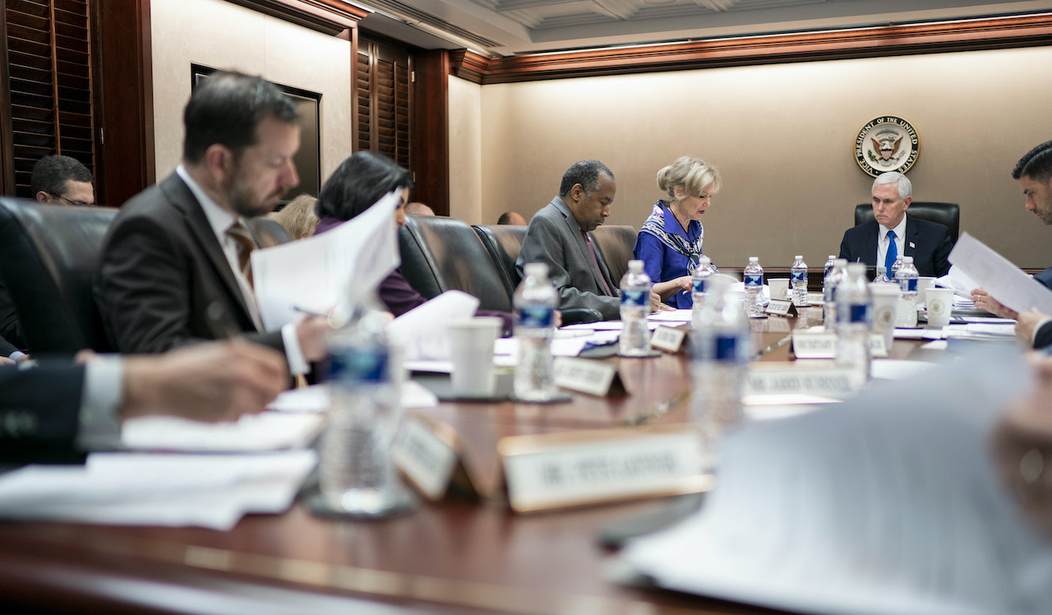As the nation waits on results from the ongoing clinical trial in New York on the use of the anti-viral hydoxychloroquine to treat coronavirus — information likely expected in the coming weeks if not days — a cynical political battle has begun brewing over its use, with at least one blue-state governor actually threatening physicians and pharmacists if they prescribe the drug to COVID-19 patients.
The governor of Michigan Gretchen Whitmer’s Department of Licensing and Regulatory Affairs wrote a letter March 24 to all “licensed prescribers and dispensers” that was little more than an obvious threat of “administrative action” against doctors who prescribe the drug for coronavirus, and a warning to pharmacists to ignore doctors requests to fill prescriptions.
Writing in the Detroit News, freelance investigative journalist Kathy Hoekstra notes that “[e]ven worse, the letter indicates health care providers are ‘required to report’ their fellow physicians who are prescribing these medications.”
The political battle over hydroxychloroquine is tied to the president’s touting it as a potential game changer prior to the clinical trial in New York, with his detractors asserting that because it is used “off-label” to treat coronavirus (the drug is already approved by the Food & Drug Administration for other uses), it’s a risky proposition to let doctors prescribe it for use to treat pandemic victims.
However, as Hoekstra rightly notes:
“Off-label” use of medications is legal and common. It may even account for as many as 1 in 5 prescriptions in the United States. This practice is even accepted by the FDA. Furthermore, given the severity of the COVID-19 pandemic and the promise of these medications the FDA has avoided condemning the “off-label” use of hydroxychloroquine for COVID-19.
Recommended
Of course some of the pushback around the use of hydroxychloroquine comes from a small study conducted in China that insists the drug has no effect as a treatment for COVID-19. That headline has popped up everywhere in the last several days.
Less discussed is this headline from The Times of India, indicating that doctors in intensive care units in that country are being asked to take the drug as a precautionary measure even if they are asymptomatic. Pay close attention to why one doctor has decided against taking it.
Recently, the national task force for covid-19 constituted by the ICMR [Indian Council of Medical Research] had recommended the use of hydroxychloroquine for treatment of the virus-infected, high-risk population. The advisory says that this treatment should be included for asymptomatic workers involved in the care of suspected or confirmed cases, and asymptomatic household contacts of laboratory confirmed cases.
Most of the doctors, nurses, paramedics, and hospital attendants at work but some are reluctant. A doctor in Government Medical College and Hospital, sector 32, said, “This does lowers the count of white blood cells that we need for immunity, so I preferred not to take it. Besides, it’s not mandatory.”
Meanwhile, there are clinical trials happening all over the world, including Brazil where the virus has begun to show itself (a particular concern since the Southern hemisphere is about to enter their winter months and there’s some evidence the virus does better in colder conditions).
And the French have already produced a well-known study that recommends “COVID-19 patients be treated with hydroxychloroquine and [antibiotic] azithromycin to cure their infection and to limit the transmission of the virus to other people in order to curb the spread of COVID-19 in the world.”
As people in America anxiously peer out their quarantine windows and negotiate the insanity of playing politics in the time of pandemic, data from New York’s clinical trial of hydroxychloroquine cannot come soon enough.
Sarah Lee is a freelance writer and policy wonk living and working in Washington, DC.

























Join the conversation as a VIP Member